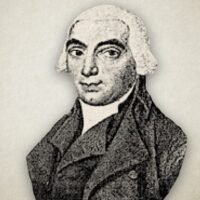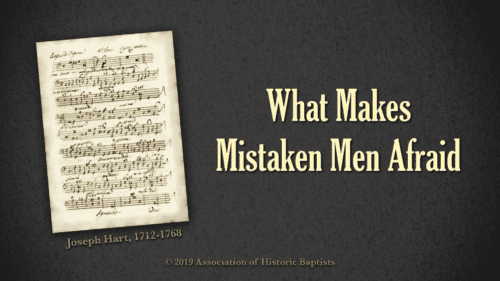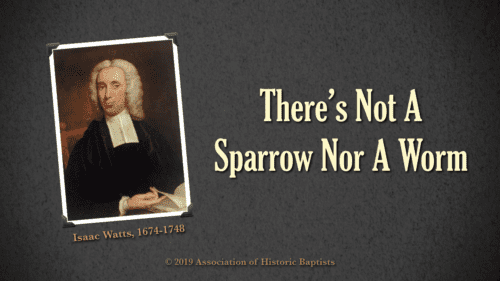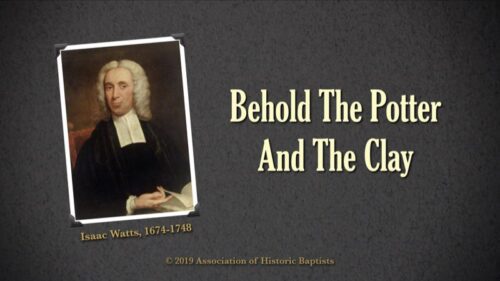‘Twas Fixed In God’s Eternal Mind
Acts 15:18: “Known unto God are all his works from the beginning of the world.”
Isaiah 46:9-11: “Remember the former things of old: for I am God, and there is none else; I am God, and there is none like me, declaring the end from the beginning, and from ancient times the things that are not yet done, saying, My counsel shall stand, and I will do all my pleasure: calling a ravenous bird from the east, the man that executeth my counsel from a far country: yea, I have spoken it, I will also bring it to pass; I have purposed it, I will also do it.”
Daniel 4:34,35: “And at the end of the days I Nebuchadnezzar lifted up mine eyes unto heaven, and mine understanding returned unto me, and I blessed the most High, and I praised and honoured him that liveth for ever, whose dominion is an everlasting dominion, and his kingdom is from generation to generation: and all the inhabitants of the earth are reputed as nothing: and he doeth according to his will in the army of heaven, and among the inhabitants of the earth: and none can stay his hand, or say unto him, What doest thou?”
Romans 9:14-24: “What shall we say then? Is there unrighteousness with God? God forbid. For he saith to Moses, I will have mercy on whom I will have mercy, and I will have compassion on whom I will have compassion. So then it is not of him that willeth, nor of him that runneth, but of God that sheweth mercy. For the scripture saith unto Pharaoh, Even for this same purpose have I raised thee up, that I might shew my power in thee, and that my name might be declared throughout all the earth. Therefore hath he mercy on whom he will have mercy, and whom he will he hardeneth. Thou wilt say then unto me, Why doth he yet find fault? For who hath resisted his will? Nay but, O man, who art thou that repliest against God? Shall the thing formed say to him that formed it, Why hast thou made me thus? Hath not the potter power over the clay, of the same lump to make one vessel unto honour, and another unto dishonour? What if God, willing to shew his wrath, and to make his power known, endured with much longsuffering the vessels of wrath fitted to destruction: and that he might make known the riches of his glory on the vessels of mercy, which he had afore prepared unto glory, even us, whom he hath called, not of the Jews only, but also of the Gentiles?”
Romans 11:2-6: “Wot ye not what the scripture saith of Elias? how he maketh intercession to God against Israel, saying, Lord, they have killed thy prophets, and digged down thine altars; and I am left alone, and they seek my life. But what saith the answer of God unto him? I have reserved to myself seven thousand men, who have not bowed the knee to the image of Baal. Even so then at this present time also there is a remnant according to the election of grace. And if by grace, then is it no more of works: otherwise grace is no more grace. But if it be of works, then is it no more grace: otherwise work is no more work.”
Richard Burnham (1749-1810) was a Strict and Particular Baptist pastor and hymn writer. In 1795, he was appointed the pastor of Grafton Street Chapel, Soho, a position he held until his death in 1810. After Burnham’s death, the church appointed John Stevens as Pastor, and in the year 1871, the church was one of twenty-two congregations which joined the Metropolitan Association of Strict Baptist Churches. All churches belonging to this Association at that time were Hyper-Calvinists and Close(d)-Communionists. John Gadsby wrote of him:
Richard Burnham was born in the year 1749, died Oct. 30th, 1810, aged 62, and was buried in Tottenham Court Chapel, London. He was minister of Grafton Street Chapel, Soho. In the preface to his hymns, he says, "I have labored much, in my spiritual songs, to set forth, though I own it is in a feeble way, the unequalled beauties and transcendent glories of a crucified Immanuel; and have aimed to give, instrumentally, the greatest encouragement to the weakest of the Redeemer's praying family.
Your pastor is willing to own that he is the unworthiest of the unworthy yet unworthy as he is, he humbly trusts, through rich; grace, he has in some measure found that the dear bosom of the atoning Lamb is the abiding home of his immortal soul." He died Oct. 30, 1810.






